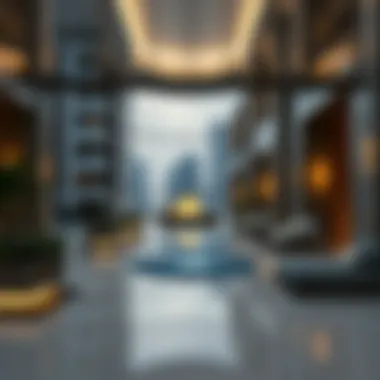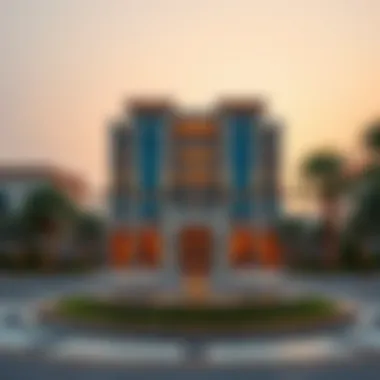Investing One Million AED in Dubai Real Estate


Intro
Investing in real estate is often seen as a solid strategy for building wealth. Dubai, with its glitzy skyline and constant development, has become a focal point for both seasoned and new investors alike. With an investment of one million AED, one can tap into the vibrant property market here. However, the landscape is not without its complexities. Understanding the current market dynamics, the right neighborhoods, and the legal environment is critical.
In this article, we will delve into the intricacies of investing in Dubai's real estate. We will explore essential market trends, discuss the most promising neighborhoods for your investment, and highlight tips for first-time investors. Through detailed analysis, you will gain insights into the potential returns and risks associated with your investment, providing you with a roadmap to navigate this remarkable market.
Understanding the Value of One Million AED
When considering a property investment in Dubai, the significance of the figure one million AED cannot be overstated. It serves as a benchmark for aspiring investors seeking to gain a foothold in one of the most dynamic real estate markets in the world. The potential of this amount hinges on several factors that shape the local investment landscape. Understanding these elements is crucial for making informed decisions.
Economic Context
Dubai's real estate market is influenced by a tangled web of economic factors ranging from population growth to tourism figures. In recent years, Dubai's economy has been on an upswing. A growing expatriate community influx and a relentless rise in tourism are driving housing demand. For those investing a million AED, awareness of the broader economic conditions is essential. This amount can afford a range of properties, but its actual value is tied closely to market conditions.
For instance, during periods of economic expansion, the demand for properties typically sees a spike, which can lead to increased prices. By contrast, in an economic downturn, buyers may find themselves in a buyer’s market, where opportunities exist to negotiate better deals. Thus, timing and economic orientation are key when looking at a million AED investment.
Furthermore, one must consider the Dubai Government's initiatives that often catalyze growth in the real estate sector. Policies promoting foreign investments, infrastructure development, and events like the Dubai Expo can influence property values significantly. Sound knowledge of these factors can equip investors to leverage their million AED effectively.
Comparative Value in Global Real Estate
Not only is the local context crucial, but so is understanding how one million AED stands in comparison to global property markets. When thought of in international terms, the purchasing power of one million AED presents both opportunities and limitations. In some global cities, such as London or New York, this amount might only net a small studio in a less desirable neighborhood. However, in others, like Bangkok or certain areas in Eastern Europe, it can secure a lavish apartment with sea views or even a charming villa.
In Dubai, particularly, a million AED offers a diverse array of choices, from modern apartments in bustling districts to villa-style homes. This comparative advantage makes it appealing for both local and overseas investors. The allure of Dubai is compounded by its status as a financial hub, boasting amenities and lifestyle options that many global cities can't rival.
“Investing one million AED in Dubai is more than a mere transaction; it's an opportunity to embed in a vibrant community and dynamic economy.”
Therefore, recognizing the value of one million AED requires analyzing it not just as a fixed number but in relation to global standards and local economic conditions. Investors must consider where this amount can take them in the ever-changing landscape of real estate. Understanding the intricacies of both local and global contexts will lead to smarter investment choices and possibly higher returns.
Overview of Dubai's Real Estate Landscape
Understanding the real estate setting in Dubai is paramount for anyone looking to invest one million AED in this vibrant market. Not only does it offer potential financial gains, but it also reflects local culture and growth patterns. The real estate landscape here is influenced by various factors such as economic fluctuations, demand and supply dynamics, and the regulatory framework set by the government. This overview serves as a keystone in comprehending how one million AED can be effectively utilized within the property market.
Market Trends and Dynamics
The real estate sector in Dubai is notoriously complex, steered by a mix of local and global interactions. Over the past years, properties have experienced shifts in value dictated by both market sentiment and economic necessities. The current trend reflects a pivot towards affordable luxury. Many buyers are looking at mid-tier developments that offer value for money without compromising on quality.
Key Trends to Note:
- Increased Developer Activity: Developers are focusing on creating more affordable housing options, appealing to both locals and expats. Projects aimed at the 1 million AED range are on the rise.
- Emerging Neighborhoods: Areas such as Dubai Marina and Jumeirah Village Circle are gaining traction for their blend of lifestyle offerings and investment potential.
- Technological Integration: Smart home features and eco-friendly designs are becoming the norm, catering to an increasingly conscious buyer base.
Dubai’s real estate is still reeling from the effects of the pandemic, but recovery trends are strong; rising job creation and a vibrant expatriate community lead to boosted confidence in property values. On the ground level, one million AED opens doors to a plethora of opportunities, particularly within newly developed communities that are emerging as hotspots.
Impact of Government Regulations
When considering a property purchase in Dubai, one cannot overlook the role of government regulations. The local government continuously updates policies to boost the real estate market. These changes can significantly affect investment strategies and opportunities.
Regulatory Influences to Consider:
- Ownership Laws: Foreign investors can own property in designated areas, which increases the market pool but comes with specific pathways that need to be navigated.
- Tenant Laws: Understanding the rental regulations is crucial, especially if you plan to generate income from your investment. There's an array of laws detailing tenant rights and responsibilities that could impact profitability.
- Dubai Land Department (DLD) Policies: The DLD has recently introduced more streamlined processes for property registration and transfers, making it easier for investors to engage in the market.
“Navigating the regulatory environment can seem daunting, but understanding these essential laws will equip you with the knowledge to make informed decisions and minimize risks.”


Government efforts, like initiatives to promote tourism and improve infrastructure, are promising signs for property growth stability. Recognizing these shifts can significantly impact your decision-making when considering that million AED investment.
In summary, the overview of Dubai’s real estate landscape creates a necessary context for investors. Both market trends and government regulations play a pivotal role, shaping the opportunities that exist for one million AED in this thriving market.
Types of Properties in the One Million AED Range
Navigating the property landscape in Dubai can feel like navigating a maze for many investors. In particular, understanding the different types of properties within the budget of one million AED is crucial. This section delves into the options available, highlighting their significance, benefits, and the key factors that potential buyers should consider.
Apartments vs. Villas
When pondering the best property type to invest in, the choice between apartments and villas stands paramount. Apartments are typically more affordable and can provide quick rental returns, especially in sought-after areas. On the flip side, villas generally offer more space, privacy, and the allure of outdoor living, which can prove appealing to families.
Considerations:
- Financial Aspects: Apartments often come with lower maintenance costs, which can be a boon for budget-conscious buyers. Conversely, villas may entail higher ongoing expenses due to landscaping and repair needs.
- Market Demand: In recent years, the demand for apartments in urban areas like the Dubai Marina has surged, providing good rental yields. Villas can attract long-term tenants, particularly in family-friendly neighborhoods like Jumeirah.
- Lifestyle Preference: A buyer's lifestyle will greatly influence this decision. Someone looking for a bustling lifestyle may favor an apartment, whereas those valuing space might lean toward villa options.
Off-plan Developments
Investing in off-plan properties involves purchasing units that are still under construction or development. This option can be enticing, especially for buyers who aim to capitalize on potential capital appreciation. Dubai's off-plan market has seen its fair share of fluctuations, yet it remains a driving force in attracting investors.
Benefits:
- Lower Initial Investment: Buyers often pay a lower price compared to completed properties. The staggered payment plans can also make it financially feasible for many.
- Customization: Certain developers may allow for personal touches or upgrades during the construction phase, enhancing the property’s appeal.
Points to Ponder:
- Risk Factor: Off-plan purchases can be risky; delays in construction or market downturns could impact the investment timeline.
- Developer Reputation: Thoroughly vetting the developer’s track record is crucial before committing, as the quality of construction can vary.
Resale Properties
Resale properties present a more immediate route for investors looking to acquire established real estate. These properties are ready for occupancy, eliminating the uncertainty associated with construction.
Advantages:
- Market Insight: Investors can analyze past rental yields and price trends which can offer a clearer picture of expected returns.
- Negotiation Opportunities: Resale properties can sometimes be negotiated down in price, especially if the seller is eager to make a quick sale.
Considerations:
- Condition of the Property: Older properties might need renovations, which could ramp up initial costs despite a seemingly attractive price.
- Location Dynamics: Established neighborhoods may offer more stability in terms of ROI compared to new developments.
Key Takeaways
- The choice between apartments and villas largely hinges on personal lifestyle preferences and long-term financial goals.
- Off-plan developments can yield significant returns but carry higher risks; diligent research into developers is essential.
- Resale properties offer immediate benefits but require analysis of the property’s condition and market context.
"In real estate, as in life, timing is everything. Understand your options, and you'll find the right fit for your investment strategy."
Understanding these property types will enable investors to not just choose wisely, but also maximize their returns in the dynamic Dubai real estate market. Whether it’s through the hustle and bustle of city living or the calm of suburban luxury, there’s something for every type of investor looking to make their mark in Dubai.
Top Neighborhoods for Investment
In the realm of real estate, the neighborhood can make or break an investment. When it comes to one million AED in Dubai, buyers have a wide array of options that can influence long-term returns and lifestyle. The neighborhoods you choose to invest in can determine not just your immediate living experience, but also the potential for capital appreciation and rental yields.


It’s essential to evaluate factors such as infrastructure, amenities, and overall community vibe. Moreover, understanding the demographics and market trends can provide insightful data for both experienced investors and first-timers. In the following sections, we’ll explore three standout locations that offer compelling opportunities: Dubai Marina, Jumeirah Village Circle, and Downtown Dubai.
Dubai Marina
Dubbed one of Dubai's crown jewels, Dubai Marina represents a unique blend of luxury living and a vibrant lifestyle. This area is famous for its waterfront views and bustling promenade. Investors often find this neighborhood appealing due to its high demand for rental properties.
The chance to own property in a location known for a cosmopolitan lifestyle attracts both local and expatriate residents. Moreover, the planning of this area has been meticulously crafted to include facilities such as fine-dining restaurants, high-end retail shopping, and recreational spaces.
When you think of parks, beaches, and yacht clubs, it's hard not to consider Dubai Marina. Many potential tenants are attracted to this lifestyle, which translates to strong rental demand. According to recent market reports, rental yield in this area can average between 6-7%, making it a lucrative consideration for investors.
"In Dubai Marina, lifestyle meets investment potential."
Jumeirah Village Circle
Jumeirah Village Circle (JVC) is another neighborhood catching the eye of savvy investors. Known for its family-friendly environment, JVC is characterized by its affordable properties and a sense of community that appeals to a wide range of buyers. The neighborhood has been designed with green spaces and parks, making it suitable for families seeking a peaceful living setting.
Notably, the area has shown remarkable development growth, with new projects frequently coming up. Many investors view JVC as an emerging area, where property prices remain relatively lower compared to more established neighborhoods. This factor, combined with its central location, positions JVC as a prospective hotspot for investment over the next few years.
The rental yields here typically hover around 5-6%, which are solid figures given the investment's affordability. For those keeping an eye on future capital appreciation, getting in early on the JVC property market may yield beneficial results down the line.
Downtown Dubai
Finally, there’s the iconic Downtown Dubai, which needs little introduction. Home to the Burj Khalifa and Dubai Mall, this area symbolizes luxury in every way. However, its stark price points often make it daunting for first-time investors hoping to stake a claim within this urban oasis.
Despite the higher entry price, properties here have traditionally held their value exceptionally well. The vibrancy of the neighborhood, combined with its cultural and retail attractions, creates a consistent flow of tourists and residents alike, ensuring a stable rental market.
Those investing in Downtown Dubai can see rental yields around 4-5%, which may not seem as high as other neighborhoods. Nevertheless, investors appreciate that properties here often experience greater capital appreciation over time. In the long run, it is not merely about the immediate returns but also the enduring prestige and value of the investment.
Cost Considerations for Property Buyers
When stepping into the vibrant world of Dubai’s real estate, understanding the cost considerations for property buyers becomes imperative. One million AED might sound like a considerable sum, but when purchasing property, the financial landscape stretches beyond the purchase price itself. A prospective buyer needs to navigate through a variety of costs which can significantly impact the overall investment.
First and foremost, being well-informed about associated fees and charges can make or break a deal. These additional costs include transfer fees, which typically hover around 4% of the property's value. Then there are service charges that add a further layer of expense, depending on the property’s management. Understanding these costs upfront enables investors to adjust their budget accordingly, ensuring that there are no financial surprises down the road.
Another point to consider is how financing options can shape the property investment journey, especially for an international market such as Dubai's. While some buyers might opt to pay cash upfront, many turn to mortgages or financing plans that allow them to stretch their funds while capitalizing on potential growth in property values. Each financing scheme comes with its own set of terms and conditions, which can affect the overall cost of investment significantly.
Understanding these considerations is not just about numbers; it’s about building a comprehensive strategy that aligns with one’s financial goals.
Associated Fees and Charges
When you’re thinking about buying property, a close look at associated fees and charges is crucial. These fees are not just part of the process, they can become quite hefty if not accounted for in advance.
- Transfer Fee: As mentioned earlier, this fee is usually 4% of the purchase price. It’s paid to the Dubai Land Department to officially register the property in your name.
- Administration Fee: Real estate companies often charge an administration fee for processing the purchase—this fee varies by agency but typically ranges from 1,000 AED to 5,000 AED.
- Service Charges: These are annual charges leveraged by property management companies. the fees cover the maintenance of common areas and services—always remember to check this, as properties in well-managed areas tend to have higher fees but offer better services.
- Registration Fee: A minor but necessary fee that may apply when you get the paperwork done.
Each of these fees can add an unexpected financial burden, so it is wise to request a complete breakdown from the real estate agent when comparing properties.
Financing Options
Diving into the financing options available in Dubai may feel a bit like traversing a minefield, but having a clear view of what's available can set you on the right path.
- Cash Purchases: This straightforward approach usually offers the benefit of negotiating a better price but would require having a substantial amount of liquid cash on hand.
- Mortgages: Many buyers opt for mortgages. Many banks in Dubai are willing to lend to both residents and non-residents. Typically, mortgage loans cover 75-80% of the property value, making it sound appealing. However, it’s essential to check the terms carefully—interest rates can vary widely.
- Developer Financing: In many developments, especially off-plan projects, developers offer financing options directly to buyers. These can come with more lenient terms and conditions, so it’s worth looking into.
- Islamic Financing: For those who prefer Sharia-compliant options, Islamic financing can be useful, allowing for profit-sharing rather than interest payments, which aligns with Islamic principles.


Whichever path you choose, be assured that having the right financial advice is invaluable. It not only facilitates a smoother purchase process but can also bring clarity to your overall investment strategy.
Legal Aspects of Real Estate Investment
Understanding the legal landscape surrounding real estate investment in Dubai is essential for anyone contemplating injecting one million AED into this bustling market. Navigating the legalities not only shields investors from unforeseen complications but also ensures a smoother transaction experience. Laws can be intricate, often steeped in cultural nuances and specific regulations that govern property ownership and transactions. Ignoring these could lead to costly pitfalls or missed opportunities.
Investors must grasp crucial factors such as ownership laws, regulatory compliance, and the types of ownership available. Knowledge in these areas can empower investors to make well-informed decisions, reduce risks, and optimize their returns.
Ownership Laws in Dubai
Ownership laws are fundamental for understanding how property can be acquired and held in Dubai. The UAE allows foreign investors to purchase real estate in designated areas, often referred to as freehold zones, where they can enjoy complete ownership rights. Areas like Dubai Marina and Jumeirah Lake Towers stand witness to this arrangement, offering expats the chance to own property without restraint.
However, a critical aspect of ownership laws pertains to the rights associated with it.
- Freehold Ownership: This grants the owner full rights over the property, allowing them to sell, lease, or develop as they please.
- Leasehold Ownership: This model typically permits non-UAE nationals to lease properties for a maximum term of 99 years. While it provides some level of investment security, the ownership is not as robust as freehold.
To navigate these laws effectively, prospective investors should engage with legal experts or real estate advisors to clarify any uncertainties regarding the particularities of ownership types and to ensure compliance with local regulations.
"An investment in knowledge always pays the best interest." - Benjamin Franklin
Understanding Types of Ownership
Diving deeper into property ownership in Dubai, various forms exist, each with its unique advantages and operational guidelines. Understanding these types is essential for making an astute investment decision.
- Freehold Ownership:
- Commonhold:
- Leasehold Ownership:
- Usufruct Rights:
- Long-term Leases:
- Absolute ownership of the property, which includes the land it sits on. This type provides the right to lease or sell freely, ideal for investors looking for long-term retention or resale advantages.
- A less common type of ownership, mainly applicable to apartment buildings. Here, owners have their property as well as shared rights over common areas such as gyms and pools.
- Generally inexpensive compared with freehold options but poses limitations, as the land ultimately remains owned by a third party. Good for short-term investments or rental scenarios.
- This grants the right to use and enjoy property owned by another party while investing in any improvements. While this offers some benefits in certain cases, it is typically viewed as less secure from an investment standpoint.
- A steady option for those wanting security in investment without the full responsibilities of ownership. Leases can last up to 99 years, providing structure for a long-term rental strategy.
These intricacies not only dictate how one can engage in the real estate market but also influence potential returns and strategies moving forward. Familiarity with these ownership types enables investors to strategize their purchases better according to their financial goals and risk appetite.
Given the dynamism of Dubai's property market, staying informed about legal updates is imperative to maintain a competitive edge and safeguard investments against shifts in regulations. As an investor, the importance of thorough due diligence cannot be overstated; ignorance can lead to unnecessary headaches and financial drains.
Evaluating Investment Returns
When it comes to making an investment in real estate, especially in a bustling market like Dubai, understanding returns is pivotal. This aspect serves as a compass for investors who wish to gauge the effectiveness of their financial commitments. Evaluating investment returns doesn't merely imply looking at numbers; it requires a deep dive into how those figures will shape future scenarios. In the context of one million AED, the stakes are high, and there’s no room for oversight. The process encompasses various angles, from assessing how much income a property may generate to understanding how its value could climb or decline over the years.
The analysis of investment returns is not just about immediate profitability. It involves weighing factors like location, property type, and even socio-economic conditions contributing to market performance. Ultimately, the objective is to provide a thorough understanding that empowers investors, guiding them through the intricate pathways of Dubai's real estate landscape. Many investors often become enamored with properties without fully considering their return potential, which can ultimately lead to dissatisfaction down the road.
Rental Yield Analysis
When examining the potential returns on a real estate investment, rental yield analysis is one of the most telling metrics to consider. This measure directly ties into the monthly rental revenues compared to the property's purchase price. In Dubai, this can vary widely depending on the location and type of property. For instance, properties in areas like Dubai Marina tend to fetch higher rents compared to those in more suburban locales. Investors usually find that a rental yield of 5% is pretty standard in Dubai, but certain neighborhoods might push that number closer to 7% or even 8%.
Calculating the rental yield involves a straightforward formula. Simply take your annual rental income, divide it by the property price, and multiply by 100. This method gives you a percentage that’s easier to interpret. Here's a quick example for clarity:
plaintext
Annual Rental Income = 80,000 AED
Property Price = 1,000,000 AED
Rental Yield = (Annual Rental Income / Property Price) × 100
Rental Yield = (80,000 / 1,000,000) × 100 = 8%











